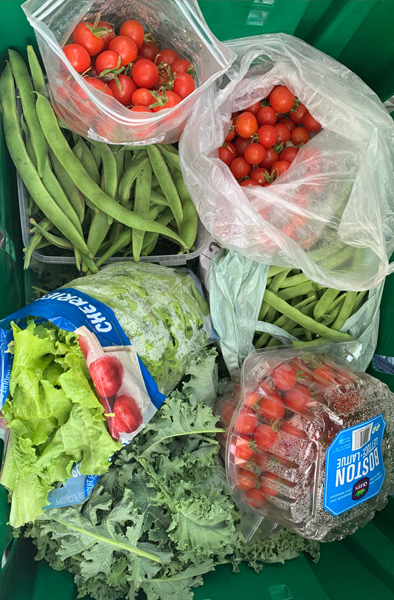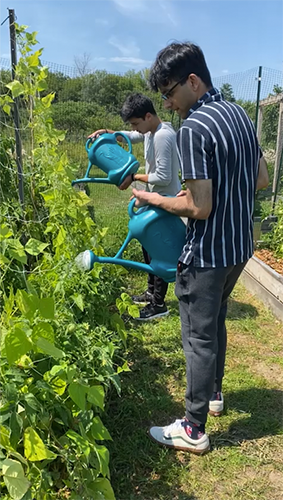
Winter 2022
During the 2021-22 academic year, University of Toronto Scarborough Management students grew more than 90kg of produce on campus and donated their harvest to the Scarborough Centre for Healthy Communities (SCHC) food bank, with plans to scale up for the next growing season.
“Our farming initiative brings together students, faculty, and staff from across the University, from a number of backgrounds both academically and culturally, to one central place around one central theme: food security. We are unified in the goal to learn through serving our neighbours,” said Dave Fenton, whose portfolio oversees Partnerships, Innovation, and Work-Integrated Learning (WIL) in The BRIDGE with the Department of Management and UTSC Library.
The idea for the WIL farm began germinating in 2019 after the Department of Management met with community agencies, including the SCHC, about ways to deepen its partnerships and impact across the Eastern GTA. Debra McGonegal, SCHC Director of Communication and Development, identified the need to obtain more fresh vegetables for the individuals and families SCHC serves. Students then surveyed community members to determine which crops to plant, with the goal of meeting the community's diverse needs (pictured: a sample of the vegetables harvested).
“Donations like this are valued, especially now, with the recent 47% increase of visits to food banks as a result of the pandemic. Scarborough is a community where racialization, discrimination, and poverty have severely illuminated health inequities. Our partnership with the University demonstrates how much more can be accomplished when we work together,” McGonegal said. “The [WIL farm] supported the nearly 4,000 monthly visits made to the SCHC Food Bank by members of the Scarborough community.”
More than 30 U of T Scarborough students across the Management and work-study programs have been engaged in the WIL farm initiative since spring 2021. Project components were embedded in Management Professor Bill McConkey’s Innovation (MGSC35) course, where students validated and assessed the farm’s business potential, and in Professor Vania Sakelaris’s Consulting and Contracting New Ways of Work (MGSC20) course supporting the development of a scale-up strategy.
“This initiative not only provided students with an opportunity to simulate a management consulting role and to apply their knowledge and skills, but also to share the output of their collective efforts with a live project sponsor versus a hypothetical one,” Sakelaris said. “Students were exposed to valuable strategic analysis frameworks that can be applied to any business in any industry.”

Located on the north side of the U of T Scarborough campus, east of the Toronto Pan-Am Sports Centre, the 10-acre Campus Farm is part of the Edible Campus program along with the Instructional Centre’s Rooftop Garden and the Edible Valley Trail. The Campus Farm includes a total of 30 raised planting beds, an Indigenous garden, and a small orchard to grow various edible crops (e.g. tomatoes, kale, garlic, potatoes, herbs, corn, squash, berries, to name a few), medicine, fruits and nuts, and flowers.
When The BRIDGE was approved for a plot on the Campus Farm, the Sustainable Innovation Group (SIG)—a student-managed club—volunteered to support the project throughout the summer 2021 growing season (pictured L–R: SIG President Rohan Chadha and SIG VP of Marketing Shub Atreya).

“We grew alongside the plants, building transferable skills through our willingness to learn, teamwork, and initiative,” said UTSC Management and International Business student Rumsha Panjwani, SIG Co-Founder and VP of External Relations.
“In order to foster a future generation of environmentally conscious leaders, the first steps are to spread awareness as well as contribute to sustainable endeavours in our own communities. Sustainability is no longer about doing less harm. It’s about doing more good, which starts by planting the seeds of sustainable growth,” added Austin Gumbs, UTSC Management Co-op student and Senior Student Advisor with SIG.